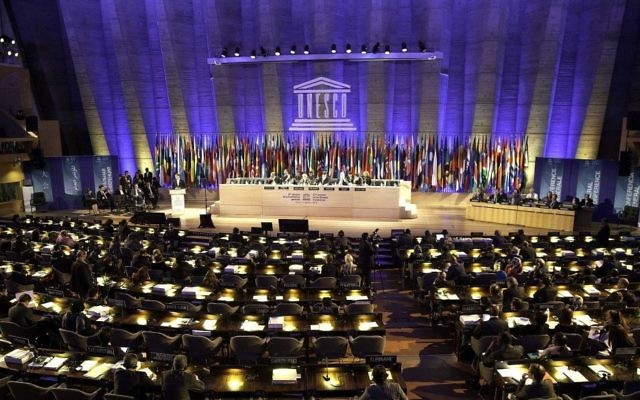Israel and US quit UN cultural agency over bias
The countries officially left Unesco, the UN's educational, scientific and cultural agency, at the stroke of midnight over claims it fosters unchecked anti-Israel bias.
The United States and Israel officially left the UN’s educational, scientific and cultural agency at the stroke of midnight, the culmination of a process triggered more than a year ago amid concerns that the organisation fosters anti-Israel bias.
The withdrawal is mainly procedural yet serves a new blow to Unesco, co-founded by the US after the Second World War to foster peace.
Donald Trump’s administration filed its notice to withdraw in October 2017 and Israeli Prime Minister Benjamin Netanyahu followed suit.
The Paris-based organisation has been denounced by its critics as a crucible for anti-Israel bias: condemned for criticising Israel’s occupation of East Jerusalem, naming ancientJewish sites as Palestinian heritage sites, and granting full membership to Palestine in 2011.
The US has demanded “fundamental reform” in the agency that is best known for its World Heritage programme to protect cultural sites and traditions. Unesco also works to improve education for girls, promote understanding of the Holocaust’s horrors, and to defend media freedom.
The withdrawals will not greatly affect Unesco financially, since it has been dealing with a reduction in funding since 2011 when both Israel and the US stopped paying dues after Palestine was voted in as a member state.
Since then officials estimate that the US – which accounted for around 22% of the total budget – has accrued 600 million dollars in unpaid dues, which was one of the reasons for President Trump’s decision to withdraw. Israel owes an estimated 10 million dollars.
Unesco director-general Audrey Azoulay took up her post just after Mr Trump announced the pullout.
Ms Azoulay, who has Jewish and Moroccan heritage, has presided over the launch of a Holocaust education website and the UN’s first educational guidelines on fighting anti-Semitism – initiatives that might be seen as responding to US and Israeli concerns.
Officials say that many of the reasons the US cited for withdrawal do not apply anymore, noting that, since then, all 12 texts on the Middle East passed at Unesco have been consensual among Israel and Arab member states.
In April 2018r, Israel’s ambassador to Unesco said the mood was “like a wedding” after member nations signed off on a rare compromise resolution on “Occupied Palestine”, and Unesco diplomats hailed a possible breakthrough on longstanding Israeli-Arab tensions.
The document was still quite critical of Israel, however, and the efforts were not enough to encourage the US and Israel to reconsider their decision to quit.
In recent years, Israel has been infuriated by repeated resolutions that ignore and diminish its historical connection to the Holy Land and that have named ancient Jewishsites as Palestinian heritage sites.
The US State Department could not comment because of the government shutdown.
Earlier, the department told Unesco officials that the US intends to stay engaged at Unesco as a non-member “observer state” on “non-politicized” issues, including the protection of World Heritage sites, advocating for press freedoms and promoting scientific collaboration and education.
The US could potentially seek that status during Unesco Executive Board meetings in April.
The United States has pulled out of Unesco before. Ronald Reagan’s administration did so in 1984 because it viewed the agency as mismanaged, corrupt and used to advance Soviet interests. The US rejoined in 2003.

Thank you for helping to make Jewish News the leading source of news and opinion for the UK Jewish community. Today we're asking for your invaluable help to continue putting our community first in everything we do.
For as little as £5 a month you can help sustain the vital work we do in celebrating and standing up for Jewish life in Britain.
Jewish News holds our community together and keeps us connected. Like a synagogue, it’s where people turn to feel part of something bigger. It also proudly shows the rest of Britain the vibrancy and rich culture of modern Jewish life.
You can make a quick and easy one-off or monthly contribution of £5, £10, £20 or any other sum you’re comfortable with.
100% of your donation will help us continue celebrating our community, in all its dynamic diversity...
Engaging
Being a community platform means so much more than producing a newspaper and website. One of our proudest roles is media partnering with our invaluable charities to amplify the outstanding work they do to help us all.
Celebrating
There’s no shortage of oys in the world but Jewish News takes every opportunity to celebrate the joys too, through projects like Night of Heroes, 40 Under 40 and other compelling countdowns that make the community kvell with pride.
Pioneering
In the first collaboration between media outlets from different faiths, Jewish News worked with British Muslim TV and Church Times to produce a list of young activists leading the way on interfaith understanding.
Campaigning
Royal Mail issued a stamp honouring Holocaust hero Sir Nicholas Winton after a Jewish News campaign attracted more than 100,000 backers. Jewish Newsalso produces special editions of the paper highlighting pressing issues including mental health and Holocaust remembrance.
Easy access
In an age when news is readily accessible, Jewish News provides high-quality content free online and offline, removing any financial barriers to connecting people.
Voice of our community to wider society
The Jewish News team regularly appears on TV, radio and on the pages of the national press to comment on stories about the Jewish community. Easy access to the paper on the streets of London also means Jewish News provides an invaluable window into the community for the country at large.
We hope you agree all this is worth preserving.






















